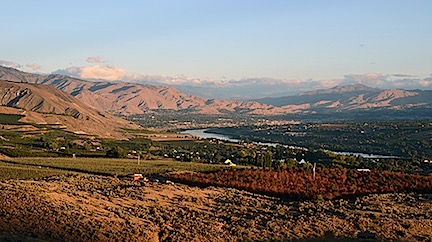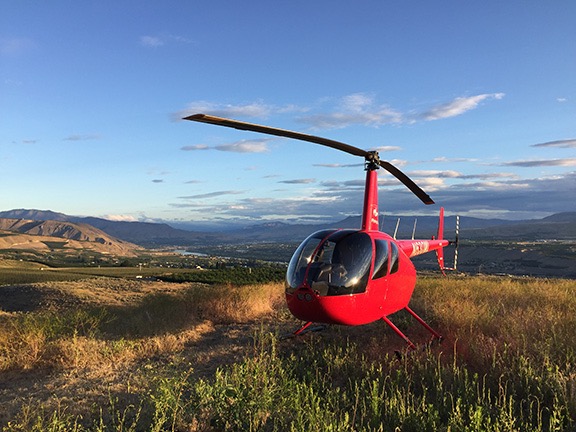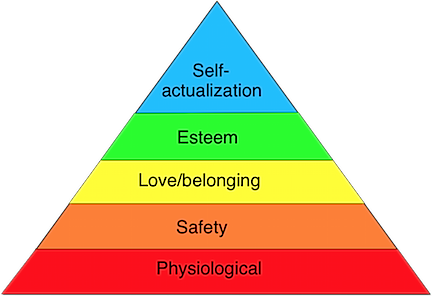A response to some of the comments I’ve been getting, along with an update.
First of all, I want to thank the over 70 (so far) people who have taken the time to comment on my “Another Stupid Pilot Trick” post. It took me about a week to write it, mostly because I was embarrassed about what I’d allowed to happen to me, and I was feeling more than a little sensitive about that. I almost didn’t leave comments open on the post. But I’m so very glad I did. The outpouring of understanding and good wishes has been amazing. I didn’t get a single nasty or hurtful comment — which is pretty amazing given the percentage of low-life scum we all see bottom feeding on the Internet. You folks rock.
What’s really weird to me is how many people came to read the post. Apparently, it was picked up on Facebook or somewhere else and went a little viral. For two days in a row, it got more than 10,000 hits. So a lot of the comments I got were from complete strangers, including a lot of pilots.
The blog isn’t the only place I got feedback. I also got some on Twitter and a little on Facebook. I got a few email messages and even one phone call. Everyone was amazingly kind and made me feel good about my friends, acquaintances, and the pilot community.
Thank you.
Why “Stupid Pilot Trick”?
First, an explanation.
A friend of mine took some offense at the title of the blog post. She said:
I have to say I don’t like the title of your blog. It made me feel like you were hot dogging or pushing the helicopter to it’s limits.
Understandable. A lot of pilots use the phrase “stupid pilot tricks” to refer to that kind of behavior.
But as I explained:
“Stupid pilot trick” is the phrase I’ve always used to refer to accidents caused by pilot error. I’ve used it in discussing other accidents so I thought it appropriate to use it when discussing mine.
She seemed satisfied with that. I hope other readers are, too.
My Recovery
I’ve had some more time to recover both physically and mentally.
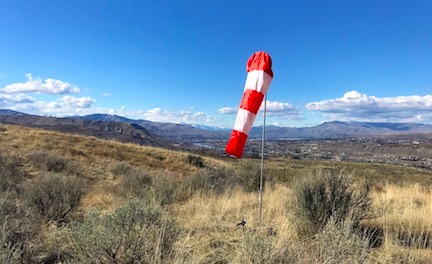
One of my home projects was to replace my old, faded windsock with a bigger, brighter one. I even installed solar spotlights to illuminate it at night.
The bruises are almost gone — the one on my right leg, which my doctor says might take several months to disappear, is pretty much the only one left. (I’d include a photo of the way blood under my skin is now pooling on the right side of my right foot, but do we really need to see that? I don’t think so.) I had low-grade, nagging headaches for a while but they’re all gone now. I’d say I’m pretty much back to 100%, and that’s good. It’s springtime and I’ve got a ton of work to do in my garden and a long list of projects around the house to tackle.
Mentally, things are a bit weird. I think I’m suffering a bit from survivor guilt. You see, about three weeks before my mishap, a friend of mine was in a helicopter crash in eastern Washington state. He’d been doing some animal capture work with two biologists on board his Hughes 369 helicopter. One passenger died and my friend and the other passenger were seriously injured. No one knows what happened because no one can remember. My friend was in a coma for two weeks with a 10% chance of survival. He’s a young guy, though, and he came out of it. They did reconstructive surgery on his arms and legs. His wife recently sent me a photo of him in physical therapy. He’s got a long road ahead of him.
I didn’t want them to know about my crash mostly because I felt bad that I’d survived with very little injury and he’d very nearly died and will be working on his recovery for months (or more?) to come. But his wife found out — probably through the hoopla over the blog post. They’re okay with it — I mean, why wouldn’t they be? — and I know now that my survivor guilt is idiotic. I’m coming to terms with that slowly.
The gaps in my memory of the event are also bothersome. I still don’t remember anything from the time the helicopter went through the trees — which was very loud and seemed to take forever — to the time I was on the ground and realized I could get out. Somewhere in there, the helicopter hit the ground at least twice and turned 180 degrees but I don’t remember it at all. And no, I didn’t pass out; I had no head injury other than getting my brain rattled around a bit. I also don’t remember using the fire extinguisher, although I apparently did. And what did I do during the 30 minutes between when I texted another pilot right after getting out of the helicopter and finally calling 911? I remember parts of two telephone conversations I had during that time, but not 30 minutes worth of anything. I’ve never experienced memory gaps like that before and it continues to bug me that that time is missing.
I should stress that my memory beyond that is fine. My brain is back to functioning at 100% of whatever it was functioning at before the crash.
Counseling? No Thanks.
About two weeks after the crash, I got a letter in the mail from an organization that offers support to pilots after crashes. My response was to get angry. Very angry. So angry that I wrote an email to the guy who sent it, berating him for assuming that I needed help.
Fortunately, I didn’t send it. I grew to realize, with the help of some of my Twitter friends, that some pilots do need help getting past a crash and that the organization would probably be very helpful to them.
A lot of the comments I got from people about the crash assumed that I was seriously traumatized by it. But am I?
I don’t feel that I am and I think I know why.
You see, if you were to make a list of the traumatic things in my life and rank them by how traumatizing they were, this crash would actually appear pretty far down the list. I don’t want to share the list — jeez, why would I want to revisit all the things that have traumatized me throughout my life? — but I will offer one example: the man I lived with for 29 years, who I loved and trusted with my life, cheated on me (with a woman old enough to be my mother!), lied to me (and a judge, under oath), and then tried (and failed) to ruin me financially through a long, drawn-out divorce battle. You don’t think that’s pretty traumatizing? A helicopter crash I walked away from with just scrapes and bruises is nothing compared to that.
(So yes, my crazy divorce prepared me for a helicopter crash. Thanks, honey!)
It’s all relative.
If you remember nothing else from this post, remember this: When you live life, shit happens. The more you live, the more shit happens. I’d rather deal with the shit that’s a byproduct of life than to have no life at all.
‘Nuff said.
Getting Back in the Saddle
I don’t need counseling. What I need is to fulfill my desire to get back into the cockpit and go flying.
No, I’m not afraid to fly now — although I admit I have no interest at all in flying at night. (Other than the “Moonlight Dinner Tours” I did in Phoenix between 2005 and 2011, I never really enjoyed flying at night.) Knowing what caused the crash — distracted flying at night — and what I can do to prevent it from happening again — pay attention, idiot! — takes away any fear I might have of flying again. After all, I really am a decent pilot — a “good stick,” I’ve been told. I flew my R44 like most people drive their car — or maybe even better. (Actually, probably better considering the way some people drive.) I’ve learned my lesson and am eager to get back in the cockpit.
Of course, that means getting another helicopter. I’m working on it. The week after the crash, I put in an offer on a helicopter in Canada, but the guy’s price, which I thought was high, was firm and he wasn’t interested in helping me get it into the U.S. And then there’s all kinds of paperwork to deal with when bringing an aircraft down and I’m simply not interested in dealing with any of that. So I’ve scratched all Canadian helicopters off my list.
I’ve also rethought my strategy on buying a new helicopter. Rather than getting one in the same condition as the one I lost — jeez, it was just a year out of overhaul! — I figured I’d buy one that needs an overhaul in two to five years and get the overhaul done when the time came. That meant I could buy a helicopter for cash using the insurance proceeds and save up for the overhaul. Without a helicopter loan, saving up would be possible. After all, I did it in 2013-16 after paying for a divorce, buying land, and building a home. (I do make a decent living as a pilot and still earn royalties on some of my writing work.) Then, in overhaul, I could get it fixed up to be more like the one I lost.
With that in mind, there are three candidates I’m considering. The closest is in Phoenix and I’ll likely check it out within the next week or so. I’m hoping we can go for a test flight.
I will admit one thing here: not long after the accident, when I first started thinking about buying another helicopter, there was a fleeting moment when I considered taking the insurance money, putting it in the bank, and not buying a helicopter at all. I’m a little young for retirement — although I consider myself semi-retired since I only work half the year — but financially, I’m secure enough to call it quits now if I want to. And I could still manage my cherry drying contracts every summer for a little side income. It would be an easy way out of the inconvenient mess I put myself into. But there’s no challenge in easy and I’ve come to believe that I live for challenges.
And I’m not ready to give up yet.
On Bravery
A lot of the people who commented about my blog post or contacted me other ways told me I was brave to tell my story. I’m having a little trouble wrapping my head around that.
You see, I don’t consider telling my story about what happened “brave.” It happened because I was dumb and let it happen. It’s embarrassing, but not something I could (or should) hide.
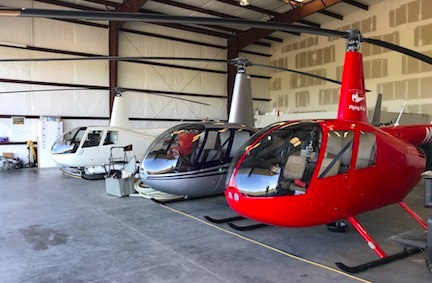
This is the last photo of N630ML in one piece. I was one of a team of three frost control pilots. This was shot in the hangar we were based in at Yolo County Airport.
Like it or not, I have a bit of a public persona. Part of it dates back to my writing days when I did a lot of public appearances. Part of it is because of this blog and my general outspokenness. There was no way in hell that I could crash a helicopter and prevent people from finding out. After all, one day, I’m flying a beautiful red helicopter with my initials in the N-number and a few months later I’m flying something completely different. And it isn’t as if pilots don’t read the NTSB reports. I do.
And why should I hide it? I did something dumb. If I could admit it and other people hear about it and that prevents them from doing the same dumb thing, I might save lives. Why wouldn’t I do that?
It’s not bravery that has me writing about this. It’s common sense. It’s caring about the pilot community and the passengers that pilots carry. It’s wanting to use my experience as a teaching moment for others.
And let’s face it: I’m in my mid 50s, approaching the end of my flying career. I’m self-employed and am not going to lose my job by admitting I did a dumbass thing that could have killed me and totaled my helicopter. I’m not worried about future employment because I’ve already come to terms with this fact: very few employers would consider hiring a middle aged, outspoken and set-in-her-ways woman with only 3700 hours of helicopter flight time for any flying job that would really interest me.
So what’s so brave? I’ve got nothing to lose by speaking out.
Dealing with the FAA and NTSB
Some pilots reading this might want to know what it’s like to deal with the FAA and NTSB after an accident. Let me fill you in.
First, I have to stress how lucky we all are. First, I survived with very little injury and a decent memory of what happened. I’m not in denial about what happened and why it happened. I’m not interested in hiding the facts. No one other than me was involved in the crash. There was no property damage — other than the trees I “trimmed” on my way to the “landing zone.” (Humor does help.) The crash was never even reported in the local news. The only photos that exist are the ones taken by police — I assume; I haven’t seen any — me, and my friend Sean who was there for the recovery. All this makes it a lot easier for everyone concerned.
The NTSB was the first to get in touch. Their local guy called while I was still in the hospital. (I was in the hospital for less than 3 hours.) I think he got my number from the police. I gave him a verbal account of what I remembered over the phone. He was very kind and polite. And relieved, it seemed. By simply surviving and telling him exactly what happened I was making his job very easy. In fact, the NTSB didn’t even come out to the accident site. They got a lot of information from the police, I guess. They released the helicopter for recovery within 3 hours of the crash. It was removed by noon the same day.
The FAA’s Sacramento office got in touch three days later. I was at Heli Expo in Las Vegas by then. I spoke for about 15 minutes on the phone with an inspector, telling him pretty much the same thing I’d told the NTSB. He asked if I’d be interested in doing a presentation at a WINGS safety seminar in my area. Sure, I told him. I want other people to know how easy it is to let complacency kill you. He recommended that I get back in the cockpit and start flying as soon as possible, perhaps with a CFI. (Another one worried about my state of mind.) He asked me to send him a summary of the crash in writing via email and I took down his email address. The next day, I sent him the same stuff I’d sent my insurance company.
About a week after the crash, an NTSB investigator from Washington called. I gave him the same information. He said he’d send a report I needed to fill out and warned me that I’d have 10 days to complete it and send it back. It got lost in email and was resent and the 10-day clock started when I confirmed receipt. Then I forgot about it. I remembered it six days later and spent about an hour filling it out. It was pretty straightforward, asking for basic information about the aircraft and my logged flight time, as well as a narrative about the crash. There were full pages I was able to skip because there were no other aircraft involved and no other crew members or passengers.
Along the way I had to tell my Part 135 POI that the helicopter no longer existed. He asked me to write an email officially asking to remove it from my Part 135 certificate. That was a 10-minute job.
And that’s it, so far. Although the FAA might ask me to do a special check ride with them, no one has asked yet. I don’t think there’s any doubt that I know how to fly safely. I was very forthcoming with the dumb thing I’d done that caused the accident. I do my Part 135 check flight in June anyway and I bet it would take them that long to schedule a special flight.
So my dealings with the FAA and NTSB have been pretty worry-free and very professional. I’m happy with the way they all actually seemed to care about me and my wellbeing. There were no accusations or unfair finger-pointing. After all, how could there be? I blamed myself because it’s my fault.
Why Deny the Truth?
And that’s another weird thing that I’ve realized: too many pilots won’t take blame for accidents that are their fault.
I know a good example. A few years back a pilot was flying a Schweizer 300 on a cherry contract. He had full fuel and another pilot on board so they were pretty close to max gross weight. He came in over a cherry orchard at high speed and made an aggressive turn that involved coming to a stop and descending. The helicopter went right into the trees. He claimed that the engine lost power but the NTSB, which took the wreckage in for investigation, could find nothing wrong with the engine. Instead, they reported that the accident had been caused by the maneuver he’d used to come in over the orchard: descending at a near stop had likely caused him to settle into his own downwash. Settling with power.
While it’s true that the pilot may really believe that the engine lost power, it’s more likely that he’s in denial of what really happened and his part in the cause of the accident. After all, when you get into settling with power, pulling pitch just makes it worse. It might seem as if there’s an engine problem. But we’re trained to avoid, recognize, and recover from settling with power and he was a flight instructor so he should understand what happened.
I’ve met this pilot and years after the accident he was still defiant, claiming the NTSB had gotten it wrong. As if the NTSB, which exists to investigate transportation related crashes, doesn’t know what it’s doing.
Now suppose I was in denial about my part in this accident. Suppose I claimed that the helicopter had lost power in flight and I’d found myself flying into trees. All of a sudden, the case isn’t cut-and-dry. The NTSB would have to take possession of the wreckage and perform all kinds of tests on the engine to see if it had lost power and why that might have happened — all on the taxpayer’s dime. (And yes, I’m a taxpayer and I care about how the government spends our money. Don’t get me started on $30K dining room sets, please.) Robinson would get involved. Reports would be delayed, I’d be questioned over and over. All this would still be going on now — and likely for months.
At what benefit?
Isn’t it better when a pilot honestly reports what happened and takes blame when he/she is to blame?
As far as I’m concerned, this chapter in my life is nearly closed; I’m already moving forward with the things I need to do to replace the helicopter and continue my work. That wouldn’t be possible if I didn’t recognize and admit what really happened and work with the authorities to help them quickly get the facts they need to complete their investigation.
On my Well-written Account
A few folks have commented about how “well-written” my blog post about the accident was. I appreciate the praise but, in all honesty, this one makes me giggle.
While lots of people know me as a helicopter pilot, what they may not know is that I became a helicopter pilot and bought a helicopter by building up a 20+ year career as a writer. Yeah — I wrote for a living. A good living. I think that says something about my writing skills. Somebody who can’t write can’t earn enough money as a writer to pay for helicopter flight training and buy a helicopter.
I wrote boring stuff. Books about how to use computers. Step-by-step instructions with lots of screenshots and captions and sometimes even callouts. I wrote it all and I often even did the layout. I wrote for numerous publishers, some of which you may have heard of: Peachpit Press, McGraw-Hill, Macmillan, Brady, Sybex, Microsoft Press, etc, etc. Some of the later books, which I’ve self-published, are about more interesting topics. If you’re interested in numbers, the count so far is 86 books.
I also write for magazines, both print and online. I wrote for computer magazines in the old days (pre 2012) and now write for aviation magazines. The most recent issue of Vertical included an essay I wrote, right near the beginning.
I started this blog in 2003 as an outlet to write stuff I found interesting — mostly stuff from my life, including my flying life. I use it to record and save information I want to share or consult later, like recipes. I use it to vent when something pisses me off or heap praise when something makes me happy.
I’ve also been working on a book about my first ten years as a helicopter pilot. It’s about halfway done. If I get a little more motivated to work on it, I hope to have it finished by this summer. (And yes, I know I’ve been promising that for a while now.) Will it include this accident? No. I’ll save that for Book II, which will cover the next 10 years.
So to those of you who think my accident account was well written, thanks. It better be.
That’s All for Now
And that’s pretty much everything on my mind in response to the comments I’ve gotten on my accident blog post, in email, and by phone. Once again, I want to thank all of the folks who took the time to reach out. You really made me feel good.
It also brings the situation up to date as far as my plans for a new helicopter and dealing with the authorities. I’m sure some of you were curious. This should satisfy that curiosity.
Any new comments or questions? Use the comments link for this post and I’ll try my best to address them — hopefully individually this time.


